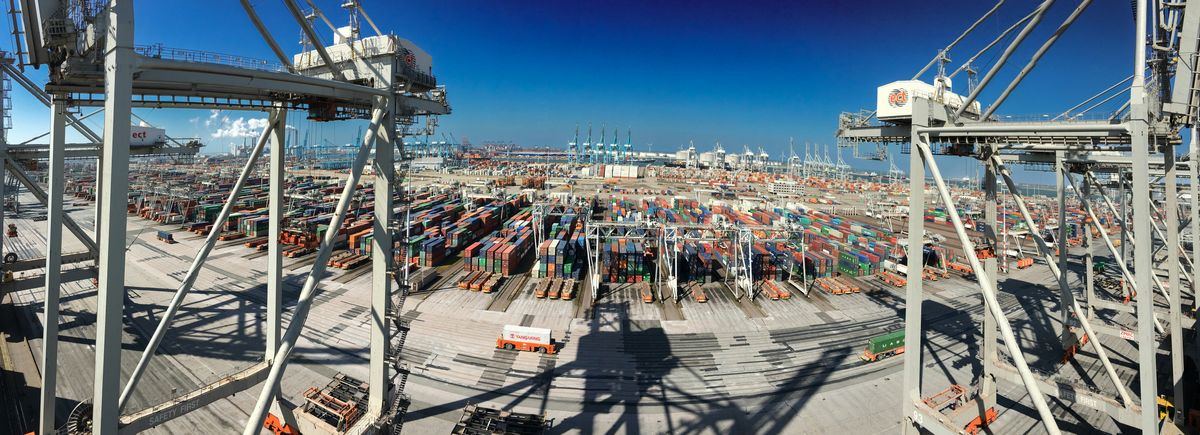Exporting food products to Germany can be a lucrative venture, but it comes with the challenge of managing unpaid invoices. Understanding the legal framework, taking preventive measures, and knowing how to address unpaid invoices effectively are critical for maintaining cash flow and ensuring the sustainability of export operations. This article explores the various strategies and legal recourses available to exporters when dealing with unpaid invoices in the German market.
Key Takeaways
- Exporters must be aware of international trade agreements, the German Commercial Code, and the jurisdictional laws applicable to export disputes to navigate unpaid invoices legally.
- Preventive measures such as conducting due diligence, setting clear payment terms, and utilizing trade credit insurance can mitigate the risk of unpaid invoices.
- A structured follow-up process, direct negotiations, and professional debt collection services are initial steps to address unpaid invoices before legal action.
- Assessment of the debtor’s financial situation is crucial before deciding on litigation, which involves additional costs, such as court and filing fees ranging from $600 to $700.
- If litigation fails, exporters have options, including withdrawal of the claim, continued pursuit through standard collection activities, or seeking alternative solutions.
Understanding the Legal Framework for Export Invoices in Germany
The Role of International Trade Agreements
When we export food products to Germany, international trade agreements are our compass. They guide us through the complex seas of cross-border commerce. These agreements lay down the rules that ensure fair play and predictability in our transactions. We rely on them to understand tariffs, regulations, and the standards that our products must meet.
To navigate these waters effectively, we’ve distilled our strategies into a few key points:
- Conduct thorough credit checks on German buyers.
- Draft clear contracts that outline payment terms.
- Build strong relationships to foster trust and ensure payment recovery.
Our experience tells us that a proactive approach is crucial. By addressing potential issues before they arise, we minimize the risk of unpaid invoices.
Remember, these agreements are not just legal texts; they are tools that empower us to protect our interests and secure our payments.
German Commercial Code and Export Transactions
When exporting food products to Germany, we must navigate the complexities of the German Commercial Code (HGB) and the Civil Code (BGB), ensuring our transactions align with these stringent regulations. Our vigilance in adhering to these legal standards is paramount for the protection of our interests.
- The HGB sets forth the obligations and rights of merchants, including exporters like us, and dictates the conduct of commercial transactions.
- The BGB provides the general legal framework for contracts, which includes those related to the sale of goods internationally.
- The Payment Services Oversight Act (ZAG) also plays a role, particularly in the context of payment processing and financial services.
German export transactions require adherence to contractual terms outlined in the BGB, HGB, and ZAG. Proactive enforcement of obligations and preparation for disputes are crucial for smooth debt recovery. We must be prepared to enforce our rights and address any disputes that arise with diligence and precision.
Jurisdiction and Applicable Laws for Export Disputes
When we’re faced with unpaid invoices in Germany, understanding the jurisdiction and applicable laws is crucial. German laws and regulations govern export payments, ensuring fair practices. This legal framework is designed to protect both parties in the transaction.
In the event of a dispute, the German Commercial Code comes into play, providing a clear legal path. We must be aware of the specific jurisdiction where the debtor resides, as this will determine the court in which legal action can be initiated.
It’s essential to have a grasp of the local laws and regulations, as they will significantly influence the outcome of any legal proceedings.
Here’s a quick rundown of our approach in such scenarios:
- Conduct a thorough investigation of the debtor’s assets.
- Assess the likelihood of recovery.
- Decide on whether to recommend litigation or closure of the case.
If litigation is advised and you choose to proceed, be prepared for upfront legal costs. These costs vary but generally fall between $600 and $700, depending on the debtor’s jurisdiction.
Preventive Measures to Avoid Unpaid Invoices
Conducting Due Diligence on Potential Buyers
We can’t stress enough the importance of due diligence. Before sealing any deals, we dive deep into the buyer’s background. Trust, but verify—that’s our mantra. We scrutinize their credit history, past transactions, and market reputation. It’s not just about ensuring payment; it’s about building lasting partnerships.
Due diligence is our safeguard against future headaches. Here’s how we break it down:
- Review the buyer’s financial stability.
- Analyze their payment history with other suppliers.
- Check for any legal disputes or insolvency proceedings.
We leave no stone unturned. Our comprehensive checks are designed to flag any potential risks early on.
Remember, unpaid invoices can disrupt our cash flow and operations. By conducting thorough due diligence, we’re not just protecting our interests—we’re also upholding the integrity of the food export industry to Germany. The recovery system includes three phases, legal actions, and communication strategies for successful debt collection.
Setting Clear Payment Terms in Export Contracts
We must be vigilant in establishing payment terms that protect our interests. Clear payment terms are the bedrock of a secure transaction. They provide a roadmap for when and how payments should be made, reducing the risk of disputes and unpaid invoices.
- Define payment deadlines and late payment penalties
- Specify acceptable payment methods
- Include detailed product and pricing information
- Outline procedures for handling disputes
Payment terms should be unambiguous and agreed upon by all parties. This clarity is crucial for swift action if payments are delayed. Remember, specificity is your ally in contract negotiations.
By setting concrete payment terms, we lay the groundwork for a smoother transaction process and establish a basis for legal recourse if necessary.
Our experience with unsettled accounts across various industries, including construction materials, manufacturing, and cosmetics, underscores the importance of this step. It’s not just about securing payments; it’s about fostering trust and reliability in our business relationships.
Utilizing Trade Credit Insurance
We protect our bottom line by securing trade credit insurance for our food products exports to Germany. It’s a safety net against unpaid invoices. When a buyer defaults, the insurance kicks in, covering a substantial portion of the outstanding debt.
- Assess the creditworthiness of your buyers.
- Choose the right insurance policy that matches your risk exposure.
- Understand the terms, including what percentage of the invoice value is covered.
By transferring the risk to an insurer, we can focus on growing our business without the looming threat of non-payment. Trade credit insurance also enhances our credibility with banks, often leading to better financing terms.
Remember, the cost of insurance is a small price to pay for the peace of mind it brings. It’s an investment in the stability and predictability of our cash flow.
Initial Steps in Addressing Unpaid Invoices
Implementing a Structured Follow-Up Process
When we’re faced with unpaid invoices, time is of the essence. We must act swiftly and systematically to increase our chances of recovery. Here’s our approach:
- Immediately after an invoice becomes overdue, we initiate the first phase of our follow-up process. This includes sending a polite but firm reminder to the debtor.
- If there’s no response, we escalate to more frequent and direct communication, including phone calls and emails.
- After 30 days, if the invoice remains unpaid, we move to the second phase, which involves more intensive efforts such as sending a formal demand letter.
Our goal is to resolve the matter amicably, but we’re prepared to take further action if necessary.
Remember, maintaining a professional demeanor throughout this process is crucial. It preserves the relationship and keeps the door open for future business, even as we assert our right to payment.
Engaging in Direct Negotiations with the Debtor
When we face unpaid invoices, direct negotiations are our next course of action. We approach this step with a clear strategy, aiming to resolve the issue amicably. Our experience shows that a personal touch can make a significant difference. We initiate contact, presenting our case firmly but fairly, and always with the goal of reaching a mutually beneficial agreement.
Persistence is key in these discussions. We follow a structured negotiation process:
- Establishing the facts and the amount owed
- Outlining the consequences of non-payment
- Proposing a realistic payment plan
We remain open to compromise but uphold our right to full payment.
If negotiations reach a stalemate, we consider alternative measures. This may include involving a professional debt collection service or assessing the feasibility of legal action. Our aim is to secure payments from our German business partners, ensuring our financial stability and maintaining business relationships.
Utilizing Professional Debt Collection Services
When we face the challenge of unpaid invoices, turning to professional debt collection services can be a decisive move. We initiate a 3-phase recovery system to tackle non-payment issues in food and beverage exports to Germany. The process begins with persistent attempts to contact the debtor, employing various communication methods to secure payment.
Phase One involves immediate action within 24 hours of account placement, including sending letters and conducting thorough investigations to locate the debtor’s assets. If these efforts don’t yield results, we proceed to Phase Two, where an affiliated attorney within the debtor’s jurisdiction takes over, intensifying the pressure with legal letterheads and calls.
Should we reach Phase Three without success, we assess the feasibility of recovery. If prospects are dim, we may recommend closing the case, incurring no cost to you. However, if litigation appears viable, you’ll need to consider the associated upfront legal costs.
Our fee structure is straightforward and contingent on recovery. For instance, accounts under one year old are subject to a 30% fee, while older accounts or those under $1000 incur higher rates. Engaging with professional services streamlines the recovery process, providing you with clear options and transparent costs.
Legal Recourse for Unpaid Export Invoices
Assessment of the Debtor’s Financial Situation
Before we decide to navigate international debt collection for unpaid export invoices in Germany, a critical step is to assess the debtor’s financial situation. This assessment is not just about whether they can pay, but whether it’s viable to pursue legal action.
- Review the debtor’s assets and liabilities.
- Analyze their cash flow and credit history.
- Consider the cost-effectiveness of litigation.
We must be methodical in our approach to ensure the highest chances of successful debt recovery.
If the likelihood of recovery is low, we may recommend closing the case, avoiding unnecessary expenses. Conversely, if the debtor’s assets suggest a reasonable chance of recovery, we may proceed with litigation, understanding that upfront legal costs will apply.
Deciding Whether to Pursue Litigation
When we’re faced with unpaid invoices, the decision to litigate is pivotal. We must weigh the potential for recovery against the costs and risks involved. If our investigation suggests that the debtor’s assets are insufficient, we’ll advise against litigation. In such cases, closure of the case is the prudent path, and you’ll owe us nothing.
Should we opt for legal action, here’s what to expect:
- Payment of upfront legal costs, typically $600-$700.
- Filing a lawsuit to recover all monies owed, including legal fees.
Our rates are competitive, and they vary based on the age and number of claims:
- For 1-9 claims, rates range from 30% to 50% of the amount collected.
- For 10 or more claims, rates decrease slightly.
Remember, if litigation doesn’t result in recovery, the case will be closed, and you will not be further indebted to us.
Deciding to litigate is not just about the present claim. It’s about setting a precedent for future transactions. Choose wisely.
Understanding the Costs and Fees Involved
When we decide to pursue legal action, we’re committing to a path with both potential rewards and costs. We must be prepared to cover upfront legal costs, which can include court costs and filing fees, typically ranging from $600 to $700. These are necessary expenses to initiate the lawsuit and are contingent on the debtor’s jurisdiction.
Our rates are competitive and tailored to the volume and age of claims. For instance, accounts under a year old are charged at 30% of the amount collected if there are fewer than 10 claims. This rate is a crucial factor in our decision-making process.
We must weigh the likelihood of recovery against the costs involved. If recovery seems unlikely, we may recommend closing the case, incurring no further fees.
Here’s a quick breakdown of our collection rates based on the number of claims and age of accounts:
-
For 1 through 9 claims:
- Accounts under 1 year: 30%
- Accounts over 1 year: 40%
- Accounts under $1000: 50%
- Accounts with an attorney: 50%
-
For 10 or more claims:
- Accounts under 1 year: 27%
- Accounts over 1 year: 35%
- Accounts under $1000: 40%
- Accounts with an attorney: 50%
Remember, if litigation fails, we close the case with no additional cost to you. This no-win, no-fee structure is designed to align our interests with yours, ensuring we are both invested in the successful recovery of unpaid fees.
Post-Litigation Scenarios and Contingency Plans
Outcomes of Legal Action and Potential Recovery
Once we’ve navigated the legal labyrinth, the outcomes are clear-cut. Success means recovery; we reclaim what’s ours. Failure, however, isn’t the end—it’s a crossroads. We assess, we learn, and we adapt. Here’s what we face post-litigation:
- Victory: We secure the unpaid invoices, and our perseverance pays off. The debtor settles the debt, and we recoup our losses.
- Defeat: The court rules against us or the debtor’s insolvency renders recovery impossible. It’s a tough pill to swallow, but not all is lost.
In the event of a win, our fees align with the fruits of our labor. A percentage of the amount collected reflects our efforts and the age of the account. It’s a fair exchange for the diligence and expertise we’ve invested.
In the case of a setback, we don’t wallow. We regroup and consider alternative strategies. The pursuit of what’s owed doesn’t wane—it evolves. We might not have won this battle, but the war on unpaid invoices is far from over.
Options if Litigation Fails
When litigation doesn’t yield the desired results, we must pivot and explore alternative avenues. We don’t give up on recovering your funds; instead, we reassess and adapt our strategy. If the debtor’s assets are insufficient or recovery seems unlikely, we may recommend closing the case, ensuring you owe nothing further to our firm or affiliated attorneys.
Persistence is key, and we may continue to pursue the debtors through standard collection activities, such as calls and emails. Our competitive collection rates are tailored to the age and size of the account, ensuring you pay only for successful recoveries. Here’s a quick overview of our rates:
- Accounts under 1 year: 30% (1-9 claims) or 27% (10+ claims)
- Accounts over 1 year: 40% (1-9 claims) or 35% (10+ claims)
- Accounts under $1000: 50% of the amount collected
- Accounts placed with an attorney: 50% of the amount collected
We stand by our 3-phase recovery system, emphasizing debtor evaluation, litigation, and collection rates for efficient fund recovery. Our goal is to maximize your chances of recouping what’s owed to you, even when the court process doesn’t pan out.
Continued Pursuit of Debtors and Alternative Solutions
When litigation doesn’t yield the desired results, we don’t just throw in the towel. We explore every avenue to recover what’s owed to us. Our approach is methodical, persistent, and tailored to the specifics of each case.
Persistence is key in the post-litigation phase. We may opt to continue standard collection activities, such as calls and emails, to maintain pressure on the debtor. Here’s a snapshot of our structured follow-up process:
- Daily attempts to contact the debtor for the first 30 to 60 days.
- Skip-tracing and investigating to obtain the best financial and contact information.
- Drafting and sending a series of letters demanding payment.
If all else fails, we reassess the situation. We consider the debtor’s assets, the likelihood of recovery, and whether to recommend closure of the case or to persist with collection efforts.
Our rates for continued collection efforts are competitive and depend on the age and size of the account. We’re committed to securing payments, whether it’s in construction materials exports, food products, or the cosmetics industry.
Navigating the aftermath of litigation can be as challenging as the legal battle itself. It’s crucial to have a robust contingency plan in place to safeguard your financial interests. At Debt Collectors International, we specialize in post-litigation scenarios, ensuring that your recovery process is as smooth and effective as possible. Our expert collectors are ready to serve you with tailored solutions that cater to your specific industry needs. Don’t let unpaid debts disrupt your business operations. Visit our website to learn more about our services and how we can assist you in turning your receivables into revenue.
Frequently Asked Questions
What legal framework governs unpaid export invoices in Germany?
Unpaid export invoices in Germany are governed by international trade agreements, the German Commercial Code, and specific laws applicable to export disputes. Jurisdiction for these disputes typically falls within the German legal system.
How can exporters prevent unpaid invoices when dealing with buyers in Germany?
Exporters can prevent unpaid invoices by conducting due diligence on potential buyers, setting clear payment terms in export contracts, and utilizing trade credit insurance to mitigate risks.
What initial steps should be taken if an invoice remains unpaid?
If an invoice remains unpaid, exporters should implement a structured follow-up process, engage in direct negotiations with the debtor, and consider utilizing professional debt collection services.
What should an exporter consider before pursuing litigation for an unpaid invoice?
Before pursuing litigation, an exporter should assess the debtor’s financial situation, consider the likelihood of recovery, and understand the costs and fees involved in litigation, including court costs and filing fees which typically range from $600.00 to $700.00.
What are the possible outcomes of legal action against a debtor in Germany?
The possible outcomes of legal action include successful recovery of the debt or, if litigation fails, the closure of the case. Exporters may also choose to continue pursuing the debt with standard collection activities or withdraw the claim without owing anything to the firm or affiliated attorney.
What are the rates for debt collection services and how are they determined?
Debt collection rates are competitive and tailored, depending on the number of claims and age of the accounts. Rates range from 27% to 50% of the amount collected, with specific rates for accounts under $1000.00 and those placed with an attorney.





